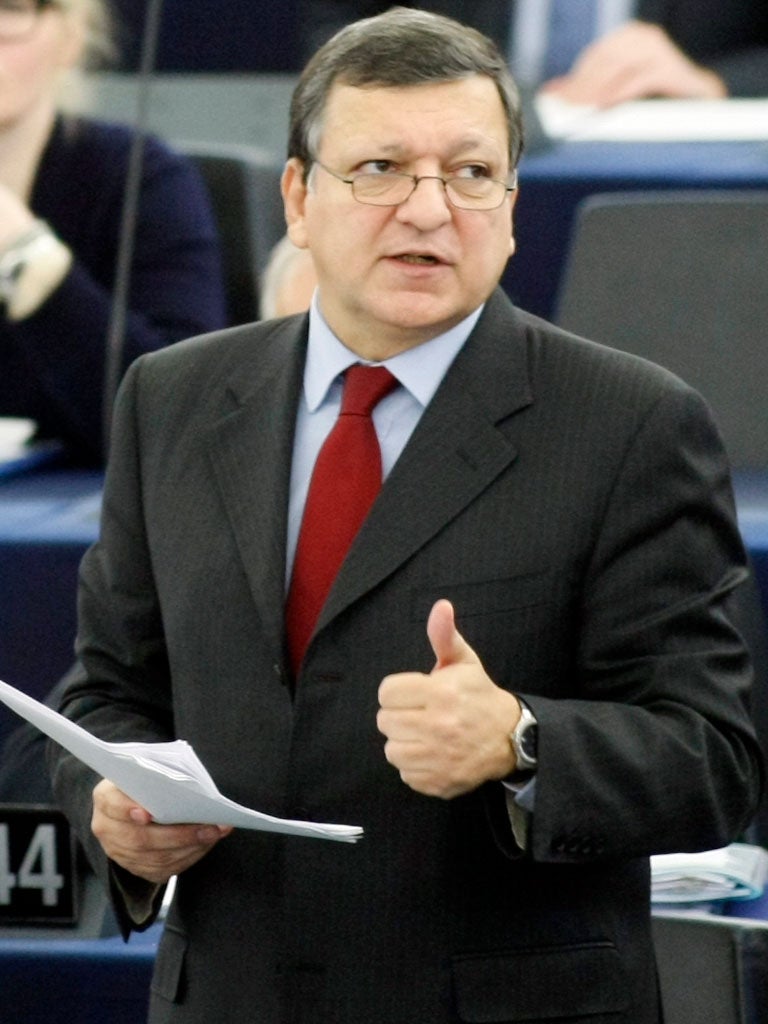John Lichfield: If Cameron ups ante on the euro, things will get very nasty
Brussels believes the PM is ready to take a step back, and Jose Manuel Barroso said he hoped for a 'constructive' relationship

Your support helps us to tell the story
From reproductive rights to climate change to Big Tech, The Independent is on the ground when the story is developing. Whether it's investigating the financials of Elon Musk's pro-Trump PAC or producing our latest documentary, 'The A Word', which shines a light on the American women fighting for reproductive rights, we know how important it is to parse out the facts from the messaging.
At such a critical moment in US history, we need reporters on the ground. Your donation allows us to keep sending journalists to speak to both sides of the story.
The Independent is trusted by Americans across the entire political spectrum. And unlike many other quality news outlets, we choose not to lock Americans out of our reporting and analysis with paywalls. We believe quality journalism should be available to everyone, paid for by those who can afford it.
Your support makes all the difference.Messy and poisonous though it already is, Britain's 26 to one row with the EU could yet become nastier and more bewildering. EU officials say that the Government has to make a critical choice in the next few days. David Cameron could reach out to his EU partners and risk howls of "U-turn" from anti-European backbenchers and the Eurosceptic press. Alternatively, he could ratchet up his row with the "other 26" by opposing the use of EU institutions to implement the "inter-governmental" plans for closer fiscal union agreed in Brussels last Friday. This could undermine already fragile market confidence in the credibility of a legally vague agreement and help to propel the euro over a cliff.
A collapse of the euro, blamed rightly or wrongly on British "dog-in-the-manger stubbornness", would make the present row "look like a passing cloud on a summer's day", one EU diplomatic source said yesterday. Despite mixed signals in his statements to the House of Commons on Monday, Brussels officials believe Mr Cameron – under pressure from his Liberal Democrat Coalition allies and from the Foreign Office – is now ready to take some of the heat out his dispute.
The European Commission President, José Manuel Barroso, said yesterday that Brussels hoped to work "constructively" with Britain in the next few weeks to "dovetail the fiscal compact" with the existing EU treaties. The same word – constructive – was used by Mr Cameron on Monday to describe his approach to the uncharted legal and political territory into which Britain, and the rest of the EU, have now stumbled.
But he also hinted that he would still expect in return some form of "exemption" for the City of London from the existing machinery for EU financial regulation. An important signal could be given as early as tomorrow when the euro group of national finance ministry officials meets to start making technical and legal sense of what was agreed in principle by the 26 governments in Brussels last Friday. Will Britain seek to send a delegate to this meeting, even as an observer? This would indicate a willingness to be co-operative, at least for a while. Alternatively, will Britain signal that it objects to such talks taking place in an EU building, involving EU Commission or EU Council officials, using EU ballpoint pens and EU notepaper?
This was the threat – what one diplomat calls the "stubborn, dog-in- a-manger" position – made by some British officials shortly after last week's summit. It was also the aggressive posture demanded on Monday by the more virulent Conservative Eurosceptic backbenchers. Brussels sources believe that London will at least adopt a wait-and-see position. It may not send an official to the euro group meeting. Nor will it make any immediate legal objection to the talks taking place.
There are precedents for groups of EU countries going it alone, such as the single currency itself and the Schengen agreement on open borders. But these were written into EU law with the full agreement of all EU members. How can institutions set up by EU treaties police an inter-governmental agreement opposed by one member state and signed outside EU law?
EU legal officials have been scouring old texts and precedents – an airline agreement from 1971; a Bangladeshi aid agreement from 1993 – to see if they offer any clues. There is an arcane possibility, under article 273 of the Lisbon Treaty, that EU governments could sue one another in the European Court of Justice, if necessary, to enforce the new discipline. How the Commission can be legally involved is less clear.
Commission and European Parliament sources said yesterday that the problem might not finally be as difficult as it appears. Sharon Bowles, the Liberal Democrat MEP who chairs the Economic and Monetary Affairs Committee of the European Parliament, pointed out that much of the small print in last week's "fiscal compact" is based on existing EU law or new proposals which have already been approved in Strasbourg.
"How obstructive Britain could really be, I'm not sure," Ms Bowles said. "In any case, Mr Cameron has been pleading for months with the eurozone countries to increase their fiscal disciple. Is he now going to say yah-boo to them if they do?"
To sum up: David Cameron is like the little boy who owns the football. He has walked off the pitch leaving the others to play – with no ball. But he is also in a difficult position. If he agrees to let the others play on, he will be accused by Eurosceptics of betraying Britain. If he destabilises an already shaky "fiscal compact", the euro could collapse, with terrible consequences for Britain as well as the rest.
Join our commenting forum
Join thought-provoking conversations, follow other Independent readers and see their replies
Comments